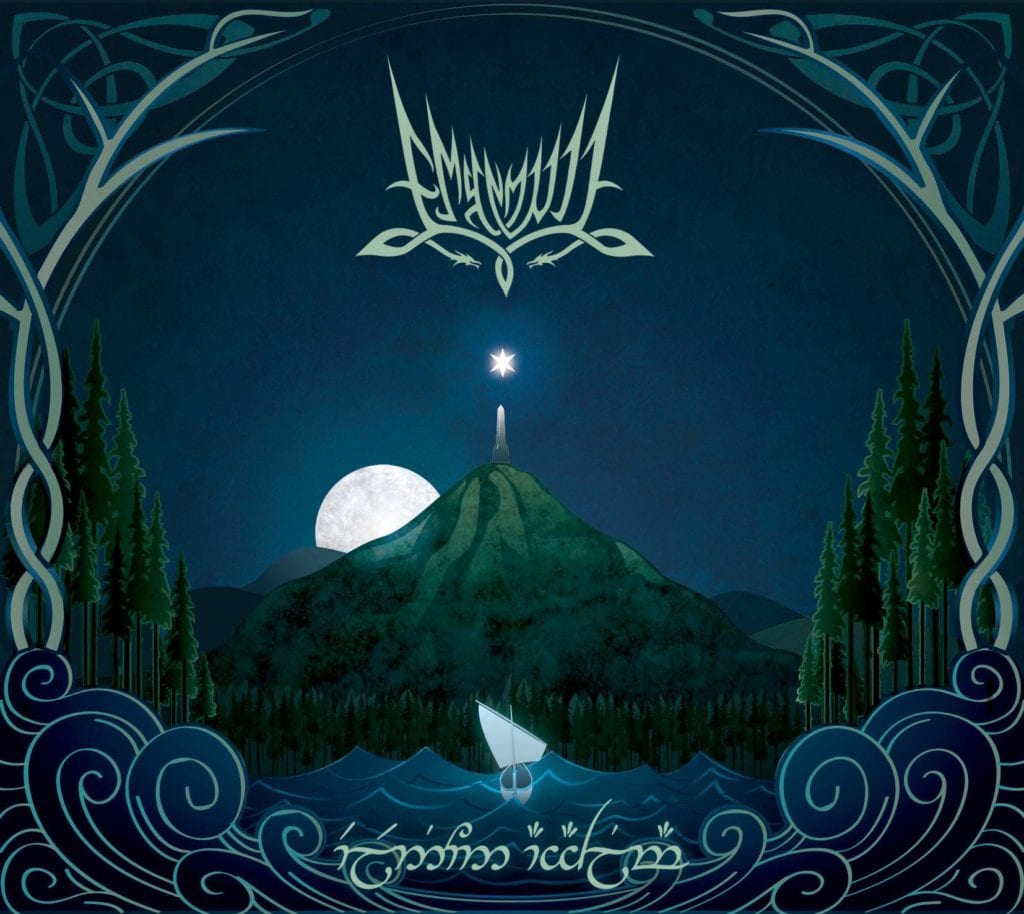The tale of Akallabêth is one of tragedy and loss, for a time when the last light of man’s purity in the eyes of the gods, the Valar, was darkened and then extinguished from the world of Arda. It tells how Elenna or Númenórë, the “Land of the Star” and “Land of Gift”, was scratched from the annals of Middle-Earth’s histories. Akallabêth is a short story originating from J.R.R. Tolkien‘s The Silmarillion and in his earlier writings. It chronicles the downfall of the once great isle of Elenna and the realm of Númenor (known later as Westernesse in the Common Tongue of Middle-Earth), a realm inhabited by the Edain and of which was shaped like a five-pointed star. The Númenóreans, the Men of Númenor, were also known as the Dúnedain; making them ancestors to characters featured in later works of Tolkien’s such as Aragorn. The account is fictionally written by the character Elendil the Tall (father of Isildur and Anárion; ancestor to Aragorn), with Akallabêth itself a translation for the native Andûnaic term for “the Downfallen”. A modern-day Atlantis myth, the story takes place at the height of the Second Age wherein the Númenóreans, those “Kings among Men”, in their pride and under false counsel betray the Ban of the Valar and ultimately lead to the island being swallowed by the sea. Those that survive the Downfall of Númenor leave for Middle-Earth, founding what would be named the realms of Exile: Arnor in the north; and Gondor in the south.
But why am I telling you all of this, you’re likely asking? On May 26th, Italian epic black metal project Emyn Muil will release its second full-length album, Elenion Ancalima – an album that conceptually deals with the Akallabêth. As with Emyn Muil’s first album, Túrin Turambar Dagnir Glaurunga, this one-man project comes again from the mind and masterful musicianship and production of Saverio “Nartum” Giove. A highly ambitious album, Elenion Ancalima aims to tell across its five tracks the waning days of Númenor: from when it shone brightly beneath the Star of Eärendil, to the reign of Ar-Pharazôn and his dark counsel by Sauron, and ultimately to the city’s downfall.
The origin of the album title comes directly from a quote said by Frodo Baggins in The Lord of the Rings. During his confrontation with Shelob in Torech Ungol during The Two Towers, Frodo exclaims whilst holding the Phial of Galadriel: “Aiya Eärendil Elenion Ancalima!” The Quenya (Elvish) phrase translates as, “Hail Eärendil, brightest of stars!” Interestingly, whilst Eärendil the Mariner doesn’t feature or have a role in Akallabêth as a character, his presence is felt by the influence he had over the Númenóreans. These men had followed the Star of Eärendil to uncover the isle of Númenor, which had been a gift to them by the Eldar (High Elves) and the Valar for their aid and sacrifice during the War of Wrath. ‘Elenna’, the name the Númenóreans gave the isle means “starwards” and is a reference to both Eärendil’s Star and the shape of the island.
When the album opens with “Under a Silvered Star”, this is again a reference to the Star of Eärendil and the Mariner’s star-borne vessel, Vingilótë (said to be the fairest ever fashioned, having been made of white timbers of birchwood from Nimbrethil, and by golden oars and silver sails). The song opens on a deep, poignant note, with the vocals carrying far off in distance and availed by sombre and fell tones. The slow rapping of drums accompanies a narrative voice, met by wistful, folkish notes and elements of hope. The sounds of boats rocking in the cool mid-morning air can be heard as the song trails off, establishing well the themes the album will be exploring.
Utterly enticing are the sounds that present themselves on the next track, “The Lay of Númenorë”. The longest track on the album (reaching over 14 minutes in length), it is a moving and emotionally resonant song that encapsulates the tragedy of Númenor’s tale. As Nartum’s vocals rise from the depths like those voices destined to be lost to the sea, the song does well to convey the impression of the Númenóreans rise to power beneath the graces of the Eldar and the light of the Valar to their equal desires for more. “The Lay of Númenorë” covers a great deal of Elenna’s history, moving across a span of over two thousand years of rulership and settling at a turning point in Númenor’s history: when Tar-Ancalimon, the fourteenth King of Númenor, turned away from the gods. As is written in Akallabêth, “…in his day the people of Númenor became divided”. From Tar-Ancalimon’s reign grew two parties, the greater of the two being the “King’s Men”: who were opposed to the Ban of the Valar; “and they grew proud and were estranged from the Eldar and the Valar.” The other was the Elendili, the Elf-friends, who became known prominently as the “Faithful”.
In the centuries to come, turmoil was rife but the splendour of Númenor still remained, for if the Númenoreans no longer held love for the Valar, still did they fear their power. The King’s Men supped and grew their wealth and majesty in the far southern parts of Middle-Earth. For it was, by the Valar’s Ban that Valinor in the west (the gods’ great home) had been denied to them. The Faithful took no part in this, however, remaining in the north to aid and maintain their friendship with the elves as the power of Sauron grew once more in Middle-Earth. The relationship between the Númenóreans, the Valar and the Eldar fractured further, and by Númenor’s twenty-third ruler, Ar-Gimilzôr, his people’s abhorrence of the Valar was at the last revealed fully: the White Tree, a symbol of the Valar’s friendship, was untended and began to decline; the use of all Elvish-tongues was forbidden, and gifts adopted from the Eldarin ships of Eressëa – a tradition that had held for millennia – was punishable. A thousands-year-old legacy of tradition was abandoned almost overnight, and finally, in his grief and anger, Manwë, the almighty King of the Valar, gave the Kings of Númenor counsel and protection no longer.
What “The Lay of Númenorë” does exceedingly well is carry over these notions of heartache and the fracturing of an empire. Once built on foundations of honour and friendship, Númenor lost touch with their gods and their allies and lost sight of their humility; wanting for more than the hallowed ground they’d been gifted. The melancholic dissonance accompanied by the ethereal vocals of Hildr Valkyrie is aided by the growing tension in the music’s multi-layered movements. Where Nartum’s vocals rise powerfully in the opening stages of the song, this high-point illustrates Giove’s versatility as an artist: both vocally-speaking and production-wise. Nartum’s vocal duality in the distant chanting he makes (adding welcome layers in the story arcs presented) and his narrative voice means that the black metal rasps you expect don’t feel trite or overused. The rasps only present themselves in important moments where it is absolutely required to further the story’s emotional impact. The ambient layerings of the album are its main focus, with everything else intended to add flavour and causal effect to the events occurring around it. This works remarkably well for Elenion Ancalima on a whole.
With the story moving forward, in the years that would come, the distance between Númenor and Valinor would grow larger. Playing out like a Greek tragedy, the reign of the twenty-fifth and last king of Númenor, Ar-Pharazôn the Golden (Ar-Gimilzôr’s grandson), is one marred by deceit and pinned with tyranny. Ar-Pharazôn is arguably the most notable character in the Akallabêth and his self-titled track is indicative of his person. Less restrained than the two previous songs, where “Under the Silvered Star” and “The Lay of Númenorë” take their time musically in establishing their stories, “Ar-Phrarazôn” is driven and continues its march forward. In much the same way that Ar-Pharazôn meets Sauron on the field of battle, his ability to force the Dark Lord to submit where Ar-Pharazôn’s forces would have ruined him matches the forcefulness in the song’s beats. As headstrong as Ar-Pharazôn is, equally can be said of his musical portrayal here. The music is once again accompanied by the familiar folk riff that carries into all parts of this record and by the cry of Eagles and the thunderclap of their wings: the royal birds of Manwë that feature as a prominent omen in the tale. Though some may argue of the folk melody’s repetitiveness, it is used rather cleverly by Nartum here who presents it as the overarching theme song for the Númenóreans: something that glitters darkly among all the heirs of Númenor’s throne, no matter the time-jumps. Sauron’s submission to Ar-Pharazôn is ultimately a turning point in the story, and being carried narratively into “Far Umbar”, the stressed tones of the music and the vocal rasps convey the growing military tensions. Sauron devises a plan to deceive Ar-Pharazôn, whispering lies into his ear and explaining that the Valar and their lord Eru Ilúvatar to be the true enemy; and that Sauron’s master, Melkor (secretly Morgoth, the first Dark Lord), is the “Giver of Freedom” and will make Ar-Pharazôn strong and deathless where the Valar denied him.
To war Ar-Pharazôn’s forces march. It is here that the last remnants of the Faithful, led by Amandil, once a councillor of the King and a dear friend to Ar-Pharazôn is dismissed (by Ar-Pharazôn’s lip, but by Sauron’s tongue). Amandil’s son, Elendil, is also sent away. Ar-Pharazôn is prideful, and in the great fear he has of his own mortality, Sauron uses this and manipulates the Númenórean king into giving himself fully to the shadow that had swept over his realm. The King’s Men sacrifice members of the Faithful and work terror and tyranny across Middle-Earth; where once his forefathers had come in peace and to teach. But in the greatest lie of all is it that Sauron’s deception and Ar-Pharazôn’s lust is complete: the idea to wage war against the Valar in Valinor (these beings who had given the men of Númenor everything). It was in Sauron’s deceit that he told Ar-Pharazôn Valinor’s fertile lands would grant him everlasting life. With a great armada at his disposal, Ar-Pharazôn met the Valar in the ancient elvish city of Tirion in Valinor. There, the world broke. As Manwë called down the might of Ilúvatar, he and the other Valar relinquished all claim to Arda and the world was fashioned anew. In the cataclysm, Ar-Pharazôn’s fleet was dragged down into the chasm that opened between Númenor and the Deathless Lands and all manner of Ar-Pharazôn’s fleet was dragged down into the abyss and swallowed by the sea. Ar-Pharazôn and his men were buried beneath falling hills, where it is said they lie in the Caves of the Forgotten until the Day of Doom.
These events play out beautifully across “Far Umbar” and “Elenion Ancalima”, wherein the mournful tones of Hildr Valkyrie’s sweet voice accompany the soft rushes of water and the poignant voices of a forgotten people that seem to sing through every note on the two tracks. The strength of Elenion Ancalima as an album is to create an atmosphere to lament for a people we never knew, yet feel like we might have at some point in a lost life. The Faithful who survived the Drowning of Númenor would go on to establish a new line of kings in Middle-Earth (one that would survive through to the Fourth Age and to the crowning of Aragorn II Elessar), and though all trace of Númenor perished with its fall including its name, it might be for a humble heart that the Straight Road to Valinor might still be permitted and that the actions that led to its downfall can serve as a warning to the sins of pride.
Elenion Ancalima is a sobering and complex album and it takes a fair few listens to truly appreciate what it has to offer. Having read over Akallabêth a number of times in preparation for this column, Elenion Ancalima matches each beat of the story marvelously and is a worthy companion to it. For fans of epic black metal and J.R.R. Tolkien, this album pays brilliant homage to this tragic tale of want and is an album that is more than worth your time.
Rating: 4/5
Band: Emyn Muil (feat. Hildr Valkyrie on guest vocals)
Album: Elenion Ancalima
Release Date: May 26th, 2017 (Northern Silence Productions / Nartum Music Projects)
Genre: Epic Black Metal
Origin: Italy
TRACKLISTING:
- Under A Silvered Star
- The Lay of Númenorë
- Ar-Pharazôn
- Far Umbar
- Elenion Ancalima














